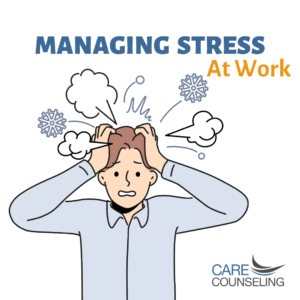Managing Stress at Work
 Work can be a significant source of stress for many people. The demands of the job, tight deadlines, long hours, and workplace dynamics can all contribute to a feeling of being overwhelmed. While some level of stress at work is normal, chronic and unmanaged stress can have serious consequences for both your mental and physical health. In this blog post, we’ll explore the importance of managing stress at work and provide you with practical strategies to help you lead a healthier and happier life in your professional environment.
Work can be a significant source of stress for many people. The demands of the job, tight deadlines, long hours, and workplace dynamics can all contribute to a feeling of being overwhelmed. While some level of stress at work is normal, chronic and unmanaged stress can have serious consequences for both your mental and physical health. In this blog post, we’ll explore the importance of managing stress at work and provide you with practical strategies to help you lead a healthier and happier life in your professional environment.
The Impact of Stress at Work
Stress at work is more than just an emotional burden; it can affect every aspect of your life. Here are some of the negative consequences of unmanaged workplace stress:
- Mental Health: Chronic stress can lead to anxiety, depression, and burnout. It affects your overall mood, leading to irritability and decreased job satisfaction.
- Physical Health: Stress can manifest physically, leading to headaches, sleep disturbances, muscle tension, and digestive problems. It can also weaken your immune system, making you more susceptible to illness.
- Productivity: High stress levels can decrease your productivity at work. It can lead to concentration problems, decreased creativity, and difficulty in problem-solving.
- Work Relationships: Stress can strain relationships with colleagues, supervisors, and subordinates. It can also lead to conflicts and affect teamwork and cooperation.
Strategies for Managing Stress at Work
Managing stress at work is crucial for your well-being and job satisfaction. Here are some effective strategies to help you cope with and reduce workplace stress:
- Identify Stressors
The first step in managing workplace stress is to identify the sources of stress. What aspects of your job or work environment are causing you stress? Once you pinpoint the stressors, you can start developing strategies to address them.
- Prioritize and Organize
Overwhelming workloads can be a significant source of stress. Prioritize your tasks and break them down into smaller, more manageable steps. Creating to-do lists and setting clear priorities can help you stay organized and reduce stress.
- Set Boundaries
Establish clear boundaries between work and personal life. Avoid overworking or taking work-related calls and emails during your personal time. Give yourself the space to recharge and disconnect from work.
- Practice Time Management
Effective time management can help you reduce stress. Set realistic deadlines and allocate time for breaks and relaxation. The Pomodoro Technique, for example, involves working for focused intervals and then taking short breaks.
- Practice Mindfulness and Relaxation Techniques
Mindfulness meditation, deep breathing exercises, and progressive muscle relaxation are techniques that can help you stay calm and centered amidst workplace stress. Incorporating these practices into your daily routine can make a significant difference.
- Communicate Openly
Don’t hesitate to communicate with your supervisor or colleagues about your stress. Discuss your workload, set reasonable expectations, and seek support when needed. Open communication can lead to a more supportive work environment.
- Seek Social Support
Build a network of supportive colleagues or friends at work. Sharing your challenges and concerns with trusted individuals can provide emotional relief and reduce feelings of isolation.
- Take Regular Breaks
Don’t forget to take regular breaks throughout the workday. Short breaks, even just a few minutes, can help clear your mind, reduce stress, and improve focus.
- Engage in Physical Activity
Physical activity is an excellent stress reliever. Even a short walk during your break can make a significant difference. Regular exercise outside of work hours can have a positive impact on your stress levels.
- Seek Professional Help
If workplace stress becomes overwhelming and affects your mental health, consider seeking professional help. A counselor or therapist can provide you with effective coping strategies and emotional support.
- Make Time for Relaxation
Integrate relaxation techniques into your daily routine. Whether it’s reading, listening to music, practicing yoga, or taking a hot bath, find activities that help you unwind and de-stress.
- Focus on a Healthy Lifestyle
A balanced diet and adequate sleep are essential for managing stress. Ensure you’re getting proper nutrition and enough rest to support your overall well-being.
- Stay Organized
A cluttered workspace can add to your stress. Keep your desk or workspace organized and decluttered to create a more calming environment.
Conclusion
Managing stress at work is essential for your overall well-being and success. By identifying stressors, practicing time management, setting boundaries, and seeking social support, you can create a more balanced and fulfilling work experience. Remember that managing stress is an ongoing process, and it’s essential to prioritize your mental and physical health.



























